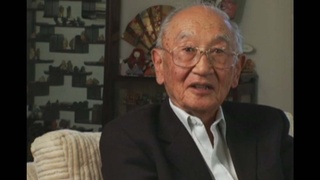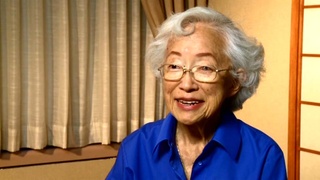Interviews
They had to succeed
We were all very, very much aware of the disadvantages of being Asian. None of us felt that we were inferior psychologically, physically, mentally, or spiritually. We felt the system was dead set against us. We also realized that there’s a certain mystique about combat soldiers and I think it goes clear back to the days when the tribe’s very livelihood depended on the success or failure of the warrior.
And so we knew…we felt that the success and failure of the Japanese…they said for the Japanese Americans in Hawaii cause they were talking Hawaii, they were all from Hawaii, but they had to do good. They had to succeed. They couldn’t fail. That their hopes and aspirations were to be as good as any other American unit. We all wished that we could be better than any other American unit, but I think what you have to realize is all this, recognize the fact that sometimes when you go to combat, you fail, not because you want to fail. I don’t think anybody goes to war to be a coward. But some people are. That’s something they have no control of.
And so therefore none of us could say, in these bull sessions, that we’re going to be the greatest or that stuff, that would be just a bunch of, how would you say, talk, it would just be hot air. But we all knew that we had to be as good as any other Caucasian outfit. And we all had to toe the line and do our best. That we all knew. And we knew that we had to shed blood. That was the price we were gonna pay. And we all had to be prepared to pay that price.
Date: August 28, 1995
Location: California, US
Contributed by: Watase Media Arts Center, Japanese American National Museum
Explore More Videos

Traumatic experiences before camp
(1913-2013) Doctor specializing in obstetrics in Southern California

Joining the hospital unit in Santa Anita Race Track
(1913-2013) Doctor specializing in obstetrics in Southern California

“Everybody went in like sheep”
(1913-2013) Doctor specializing in obstetrics in Southern California

The horror of Hiroshima after the atomic bombing (Japanese)
(1928 - 2008) Drafted into both the Japanese Imperial Army and the U.S. Army.

Finding out Roosevelt wanted Japan to attack
(1919-2020) Member of the 1800th Engineering Battalion. Promoted Japan-U.S. trade while working for Honda's export division.

Parents expected to be taken by the FBI
(1919-2020) Member of the 1800th Engineering Battalion. Promoted Japan-U.S. trade while working for Honda's export division.

525 Quartermaster Corps
(1919-2020) Member of the 1800th Engineering Battalion. Promoted Japan-U.S. trade while working for Honda's export division.

Fort McClellan soldiers
(1919-2020) Member of the 1800th Engineering Battalion. Promoted Japan-U.S. trade while working for Honda's export division.


Discrimination for Nisei doctors
(1928–2016) Daughter of an Issei doctor

Going to camp with the Terminal Island people
(1927-2010) Political Activist


Interned at age fifteen, I saw camp as an adventure
(1927-2010) Political Activist


